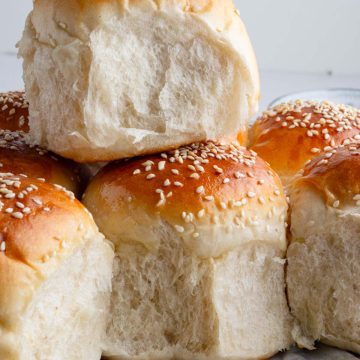
Sourdough Discard Rolls
Are you looking for a delicious way to use up your sourdough discard while reducing food waste? Look no further! These are the best and easy-to-make sourdough discard rolls are soft, pillowy, and bursting with tangy flavor—perfect for sandwiches, dinner tables, or simply slathered with butter.
Ingredients
- 400 g All Purpose flour (≈ 3 ¼ cups)
- 235 g whole milk (≈ 1 cup)
- 120 g Sourdough Discard (≈ ½ cup)
- 1 teaspoon Instant yeast
- 12 g Sugar (2 tsp)
- 8 g Salt (1 ½ tsp)
- 45 g oil or butter (3 tbsp)
Instructions
Step 1: Mixing the Dough Ingredients
- Combine all dry ingredients, including instant yeast, flour, sugar, and salt, in the bowl of a stand mixer. Mix briefly to ensure even distribution.
- Add the sourdough discard, followed by milk and oil, to the dry ingredients.
Step 2: Kneading the Dough
- Using the dough hook attachment, mix on low speed until the ingredients form a shaggy dough.
- Increase the speed to medium and continue kneading until the dough forms a rough ball and all flour is incorporated.
- Knead on medium speed for 8–10 minutes until the dough becomes smooth, soft, and slightly tacky. It should pull away from the sides of the bowl but stick slightly to the bottom.
- Switch to high speed and knead for an additional 4–5 minutes until the dough is fully supple, smooth, and pulls away from the sides and base of the bowl.
- Kneading by Hand: Transfer the dough to a lightly floured surface and use the stretch-and-fold technique. Push the dough away with the heel of your hand, fold it over, and rotate. Repeat for 15–20 minutes until the dough is smooth, elastic, and passes the windowpane test (stretches thin enough to let light through without tearing).
Step 3: Bulk Fermentation
- Place the kneaded dough in a lightly greased bowl, cover with a damp towel or plastic wrap, and let it rest in a warm, draft-free spot.
- Allow the dough to rise until it doubles in size, which typically takes 1 to 1.5 hours. Adjust time based on kitchen temperature—cooler environments may require longer.
- Note: If using active dry yeast, the rise may take slightly longer. For no-yeast recipes, proofing can take over 8 hours, depending on the vigor of the sourdough discard.
Step 4: Shaping the Dinner Rolls
- Gently deflate the risen dough and transfer it to a lightly floured surface.
- Divide the dough into equal-sized portions using a kitchen scale for uniformity.
- Shape each portion by pulling the edges toward the center, flipping it seam-side down, and rolling it into a smooth, round ball using cupped hand motions.
- Place the shaped rolls on a greased or parchment-lined baking tray, spacing them slightly apart to allow for expansion.
Step 5: Proofing the Rolls
- Cover the shaped rolls with a light towel or plastic wrap and let them proof for 45–60 minutes, or until puffy and nearly doubled in size.
- Test readiness with the poke test: gently press a finger into a roll. If the indentation slowly springs back but leaves a slight impression, they’re ready to bake.
Step 6: Baking to Golden Perfection
- Lightly brush the rolls with room-temperature milk for a golden-brown crust. Optionally, sprinkle sesame seeds on top for added flavor and texture.
- Preheat the oven and bake the rolls at 375°F (190°C) for 18–20 minutes, or until golden brown.
- Transfer the baked rolls to a wire rack and let them cool slightly before serving.
Notes
- Sourdough Discard Consistency: Ensure your discard isn’t too watery or stiff; adjust liquid in the recipe if needed.
- Yeast Activity: Activate active dry yeast in warm milk before using; instant yeast can be added directly.
- Over proofing: Avoid over proofing to prevent dense rolls; monitor dough during fermentation and proofing.
- Milk Substitute: Replace milk with water, plant-based milk, or buttermilk for variation.
- Oil Substitute: Use butter or olive oil instead of regular oil for a richer flavor.
- Sugar Substitute: Swap sugar with honey, maple syrup, or a sugar alternative if preferred.
- Flour Options: Experiment with bread flour for chewiness or whole wheat flour for a nuttier taste (adjust hydration as needed).
- Sticky Dough: Add flour (1 tablespoon at a time) if the dough is too sticky; avoid over-flouring.
- Dry Dough: Add milk or water (1 teaspoon at a time) if the dough feels dry and isn’t coming together.
- Rolls Not Rising: Check if your sourdough discard is active or if your yeast is fresh and not expired.
📝Nutrition Facts

Nutrition
Calories: 251kcal
Tried this recipe?Let us know how it was!